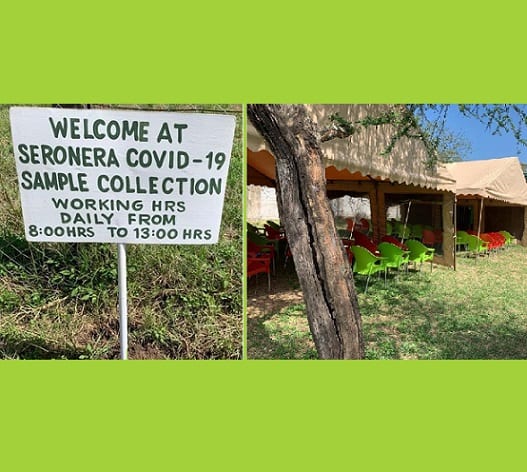Wildlife tourism in Tanzania pulls in close to 1.5 million tourists every year, bringing around $2.5 billion into the country, positioning it as the nation’s leading foreign currency earner.
- To make it easier for tourists coming to the Serengeti National Park to take in the annual wildebeest migration, a COVID-19 collection center has been set up.
- Testing will protect and reassure the tourists of their health care during this pandemic.
- The center is the latest initiative after others like the deployment of a state-of-the-art fleet of ambulances in key national parks.
Tanzania has rolled out the Coronavirus specimen collection center at Serengeti National Park in an effort to make COVID-19 testing easy and convenient for tourists.
The brainchild of the Tanzania Association of Tour Operators (TATO) in collaboration with the government, an introduction of the COVID-19 sample collection center at Serengeti National Park is among the strings of urgent measures taken lately to reassure tourists of their health care as part of a grand plan to support the industry rebound.
The Seronera (a settlement in the park) COVID-19 sample collection center, the first of its kind, is located in the heart of the Serengeti and will make testing simpler for tourists currently flocking to Tanzania’s flagship national park to enjoy the world’s annual wildebeest migration pattern.
Operations commenced on February 13, 2021, at the Seronera COVID-19 samples collection center, creating convenience for tourists who need to test while enjoying their well-deserved holidays within the national park and others forming the northern tourism circuit.
“This is a clear testimony of the importance of the key marketing mix element in the hospitality industry, namely partnership and collaboration in serving tourists for making testing easier and convenient,” said the Natural Resources and Tourism Permanent Secretary, Dr. Aloyce Nzuki.
“After several months of painstaking experiments, hard work, and considerable private funding, the Seronera COVID-19 specimen collection center, the first of its kind in the wilderness, is now ready for tourists consumption,” said TATO CEO, Mr. Sirili Akko.
Mr. Akko, the CEO of the association with 300-plus tour operators, said the body was proud to be playing its part in tackling the pandemic. “The pilot [of] the scheme runs in tandem with the rigorous safety protocols we have in place,” he explained, adding, “We continue to maintain the highest level of vigilance to stop the virus and help prevent its transmission in our country in line with the Ministry of Health guidelines.”
Measures such as thermal temperature scanning, enhanced cleaning and hygiene regimes, additional personal protective equipment (PPE), and social distancing are in place as per the protocols provided by the government.
“We believe that this will be a big relief to the tourism industry. We are indebted and grateful indeed to the Government of Tanzania for making this possible through tripartite collaboration between ourselves (TATO); Ministry of Natural Resources and Tourism; and Ministry of Health, Community Development, Gender, Elderly, and Children,” Mr. Akko noted.
The center becomes the latest initiative after others like the deployment of a state-of-the-art fleet of ambulances in almost 4 key national parks to save the lives of tourists at the height of the COVID-19 pandemic.
The UNDP-Tanzania has supported TATO financially to convert the Toyota Landcruiser donated by its member, Tanganyika Wilderness Camps, into a state-of-the-art ambulance. The funds also purchased the much-needed Personal Protective Equipment (PPE) in a bid to protect tourists and those who serve them against the COVID-19 disease.
The ambulances have been deployed into tourism hotbed areas namely, Serengeti National Park, Ngorongoro Conservation Area, Kilimanjaro National Park, and Tarangire-Manyara ecosystem. The main objective of deploying the ambulances is to assure tourists that Tanzania is well prepared to act promptly in case of emergency and as part of the national plan to roll out a welcome mat for holidaymakers.
Christine Musisi, UNDP Tanzania Resident Representative, said, “Cognizant of the tourism industry as an accelerator of sustainable development with the potential to contribute towards several Sustainable Development Goals (SDGs) due to its cross-cutting and multiplying effect on other sectors and industries, we are keen to continue supporting the government in the development of a Comprehensive Recovery Plan for the tourism industry both in Tanzania mainland and Zanzibar.”
Foreign exchange earnings from tourism in Tanzania has dropped to a 10-year low during the year ending October 2020 thanks to travel restrictions imposed by several countries across the world in response to the COVID-19 pandemic. Bank of Tanzania (BoT) figures show that Tanzania earnings from tourism in the period under review plunged by over 50 percent to $1.2 billion compared to $2.5 billion earned in a similar period in 2019. The amount was last recorded in October 2010 when the country earned $1.23 billion from the tourism industry.
Wildlife tourism in Tanzania continues to grow with nearly 1.5 million tourists visiting the country annually, earning the country $2.5 billion – equivalent to nearly 17.6 percent of GDP – cementing its position as the country’s leading foreign currency earner. Additionally, tourism provides 600,000 direct jobs to Tanzanians and over one million others earn an income from the industry.
As countries begin to recover and tourism restarts in a growing number of destinations, Tanzanian authorities have reopened its skies for international passenger flights from June 1, 2020, becoming the first country in the East African region to welcome tourists to visit and enjoy its attractions.




